 klaus-michael schneider
klaus-michael schneider
Keywords: venezuela | lara | sport | football | merida |
Links: FOTW homepage | search | disclaimer and copyright | write us | mirrors

Last modified: 2021-08-26 by  klaus-michael schneider
klaus-michael schneider
Keywords: venezuela | lara | sport | football | merida |
Links: FOTW homepage |
search |
disclaimer and copyright |
write us |
mirrors
See also:
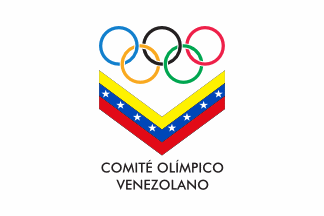 image by Zachary Harden, 6
July 2016
image by Zachary Harden, 6
July 2016
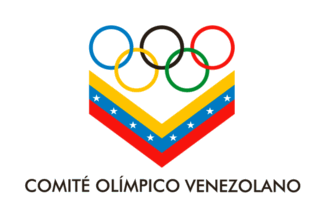 image by Tomislav Šipek,
3 May 2018
image by Tomislav Šipek,
3 May 2018
The COV (Comité Olímpico Venezolano) (Venezuelan Olympic Committee) was
established on December 23, 1935
Source:
http://www.comiteolimpicovenezolano.org/nuevocov/BIBLIOTECA.ASP?TEMA=39
The flag is seen
here (second flag from left to rigth) (website:
http://www.correodelorinoco.gob.ve/foto-dia/juntos-por-deporte-venezolano/
The flag is a white horizontal background with the
logo on the middle.
For more please see: COV
(official website).
Esteban Rivera, 3 September 2010
I have found two designs for this flag. The main flag, that Esteban wrote up,
is at
http://www.correodelorinoco.gob.ve/wp-content/uploads/2016/02/COV.jpg and it
has the logo plus text.
Zachary Harden, 6
July 2016
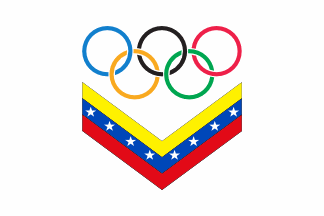 image by Zachary Harden, 6
July 2016
image by Zachary Harden, 6
July 2016
A hand flag given out to athletes at
http://puntoolimpico.com.ve/wp-content/uploads/2016/04/abanderado1.jpg shows
the logo flag, minus text.
Zachary Harden, 6
July 2016
I'd say the emblem without the text does not comply with proper Olympic
regulations. An Olympic emblem can not include the Olympic Symbol at a larger
size than a third of its area, and by removing the text the emblem shrinks to be
too small to include the Olympic Symbol at that size.
Peter Hans van den
Muijzenberg and Esteban Rivera, 6 July 2018
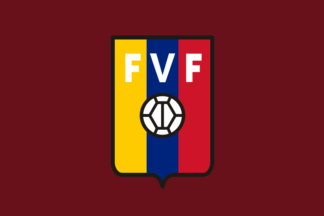 image by Tomislav Šipek, 1 April 2019
image by Tomislav Šipek, 1 April 2019
The Flag - Attributes and Semiology: Consists in a field with
approximated ratio 2:3; this is, square and half of length with
red wine background and the Coat of Arms of the Federation on the
center. Until the time of the redaction of this report is not
available data about the semiology of this flag. However, the
color red color is associate to the idea of courage, anger,
intrepidity and sacrifice,
Historical Synthesis: Although seems to exist several opinions
about the matter, the official version indicates that the use of
red wine as emblematic color of the Federation and the National
Selection of Football (Soccer) goes back to 1938 when a
Venezuelan Sport Delegation attended for first time and
international multidisciplinary event; in this case, the
"Bolivarian Games" in Bogota, Colombia and
consequently, the International Olympic Committee asked for the
authorities of National Institute of Sports to determine its
uniform, which was established as red wine t-shirt and gray
trousers. Also is commented that the election of colors obeyed to
the point of view of then President of the Institute: a
high officer of the National Guard, organism whose emblematic
color is dark red or Bordeaux red. From there, the red wine has
come fortifying as Venezuelan international sport color, with
remarkable presence in the uniforms of national selections in
another sport disciplines and consolidating more and more like a
specie of of additional emblematic international color of
Venezuela, including also institutions and activities of another
nature.
The remarkable performance that our National Football Selection
has come demonstrating lately, has come arising a patriotic
adhesion and proud feeling which are expressed in diverse dress
articles and souvenirs which derives from the team's official
t-shirts and naturally, with the appearance of flags like
previously described.
Coat of Arms - Attributes: Consist in an English shape tierced in
fesses of Or (yellow), Azure (blue) and Gules (red) disposed from
the dexter to the sinister, charging respectively on the Chief
the initials "F", "V" and "F" in
gothic capital letters in Argent (white) outlined in Sable
(black). Completes the design, a foot-ball in Argent (white)
outlined in Sable (black) on the point of pretension.
Semiology: Although until the moment of the redaction of this
report is not available official data about the matter, is
possible to infer the semiology of this Coat of Arms because is
heraldically qualified as "Canting Arms". The three
fesses remind the Venezolanity; the initials allude to the
official denomination of the entity "FEDERACIÓN VENEZOLANA
DE FÚTBOL" (Venezuelan Football Federation) and the
foot-ball naturally represents the sport that constitutes its
object.
Historical Synthesis: Although until the moment of the redaction
of this report is not available more data about the origin and
official adoption of this Coat of Arms, it was possible to
known that it was created during the management of General Jones
Parra as president of the Venezuelan Federation of Football on
1926.
Sources: Contributions of Mr. Jorge Polished of
the Planetavinotinto.com Vestibule, "Why that color?",
Article of Mr. Cristóbal War published in Daily "El
Nacional" of Caracas, section B/1, Saturday November
30th, 2002, Contributions of Licenciate Zaily Goussat, Direction
of Press of Venezuelan Football Federation, April 15th, 2004.
Raul Orta, 27 May 2004
Photo:
http://www.reporteconfidencial.info/noticia/3242275/federacion-venezolana-de-futbol-con-nuevo-presidente-/
Tomislav Šipek, 1 April 2019
Official Flag
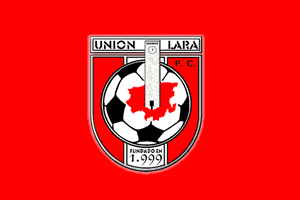 image by Jose C. Alegria, 18 June 2002
image by Jose C. Alegria, 18 June 2002
Supporters Flags
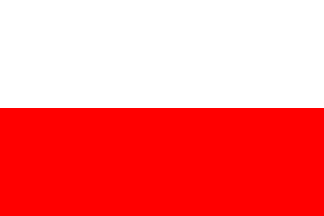 image by Ivan Sache, 6 March 2007
image by Ivan Sache, 6 March 2007
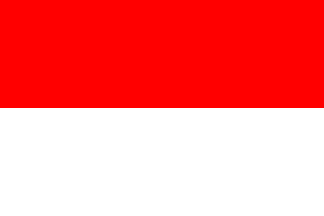 image by Ivan Sache, 6 March 2007
image by Ivan Sache, 6 March 2007
At the website of Asociacion Civil Unión Lara Fútbol Club
<www.unionlarafc.net>,
they include the club's official flag. Logo in the image is from
High Quality Football Logos.
Jose C. Alegria, 18 June 2002
Unión Lara Fútbol Club was founded in 1999 with emblematic
players from the state of Lara (the
emblem of the club, as shown of the flag, seems to use a red
geographical map of the state of Lara). The team started in 2000
in the "República Bolivariana de Venezuela"
tournament, playing its first match against Caracas Fútbol Club.
Since then, Unión Lara Fútbol Club has been playing in the
second league, missing three times accession to the first league.
The "Symbol" section quoted as the source for the flag
does not seem to exist any longer in the new website. However,
the "Images" section shows photographs taken on 27
February 2007, with supporters waving flags horizontally divided
white-red or red-white.
Ivan Sache, 6 March 2007
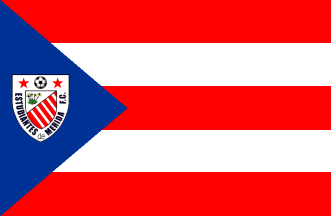 by Blas Delgado Ortiz, 12 August 2002
by Blas Delgado Ortiz, 12 August 2002
The flag of "Estudiantes de Merida Futbol Club".
Club's simbols at <www.forest.ula.ve/~pedroq/estsimb.htm>.
Jose C. Alegria, 13 August 2002
The name of the club, as proposed by Dr. José
Guillermo Soto Rosa , was approved by the Club Assembly on 4
April 1971. Registration of the club with the first league was
obtained on 17 May 1971 and the team was officially presented on
4 September 1971. The flag of the club was inspired by the flag
used by Colegio San José of the Andean University of Mérida,
the two flags differing only by their respective shield.
The first flag was made by Engineer Jorge Pereyra, who purchased
a flag of Puerto Rico for 150 bolivares and added to it the
shield of the club. The two red stars on the top of the shields
represent the two national titles won by the team in 1980 and
1985. The flower of "frailejón" is typical of the
state of Mérida. A "frailejón", lit. remote friar, is
a plant from the species complex Espeletia, belonging to the
family of Asteraceae (Compositae), emblematic of the Andean
páramo ecosystem [see <www.evoandes.net>].
Red and white are the colours of the club. The shield is very
similar to the shield of the Spanish Basque club of Athletic
Bilbao.
Source: <www.forest.ula.ve/~pedroq/estsimb.htm>.
Ivan Sache, 4 March 2007